Estimated reading time 9 minutes, 58 seconds.
When it comes to business aircraft maintenance and completions, few companies can boast a 61-year pedigree like Montreal’s Innotech Aviation.
Founded in 1955 as Timmins Aviation, the company was originally involved in aircraft sales, maintenance, repair and overhaul (MRO), and ground services. Through the years, the business–renamed Innotech Aviation in 1974–has changed hands a few times, before it was eventually purchased in 1988 by IMP Group, a multinational Canadian corporation involved in a variety of sectors, including aerospace and defence, aviation, healthcare, information services, hospitality and property development.
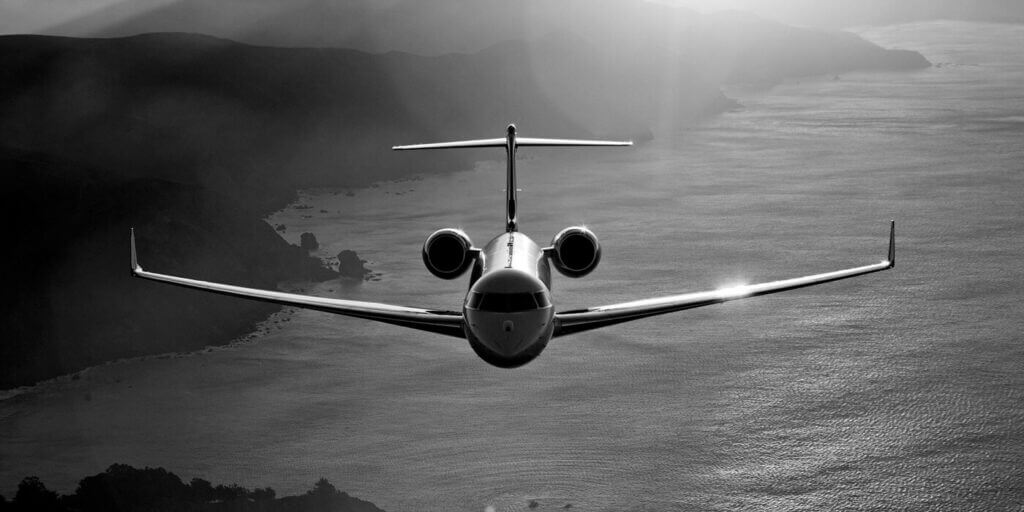
During this time period the company continued to grow, accumulating experience and expanding its capabilities. Today, Innotech Aviation occupies 200,000 square feet of hangar space at Montreal’s Pierre Elliott Trudeau International Airport. Its more than 300 staff members deliver a range of services for Bombardier’s Challenger and Global aircraft, offering not only airframe and engine maintenance and green completions, but also structural repairs, exterior paint, interior design, avionics installation, and a full list of refurbishment services.
To date, Innotech has performed over 40 Global 6000 custom interior completions and about 150 Challenger completions. According to the company website, its staff have logged more than four million man hours on the Bombardier Global alone.
“We only work on Bombardier Global and Challenger products; we’re 100 per cent exclusive to the product line,” said Rob Brooks, Innotech Aviation’s vice-president and general manager. “We have a lot of depth and expertise in these products. It takes years to be able to take 300 people and [have them] understand a single type of product as well as they do. These are very complex machines.”
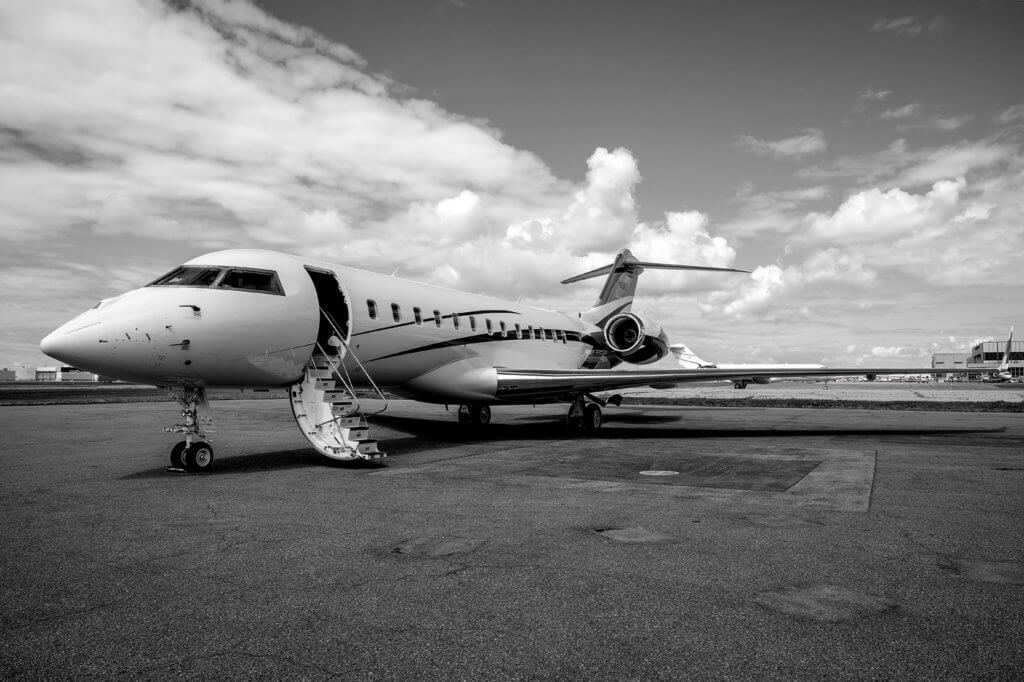
Indeed, Innotech has worked on aircraft belonging to clients in Canada, the U.S., Australia, China, France, the Middle East, Russia, Singapore, Switzerland, Thailand, and the U.K.
“It’s almost a 50/50 ratio between North America and the rest of world,” said Brooks. “We are a 40-minute flight from New York–the most active business aviation hub in the world. It’s often more competitive to do the work here and there are some distinct advantages. You could pop the airplane up here and do recurrent training at the same time, for example.”
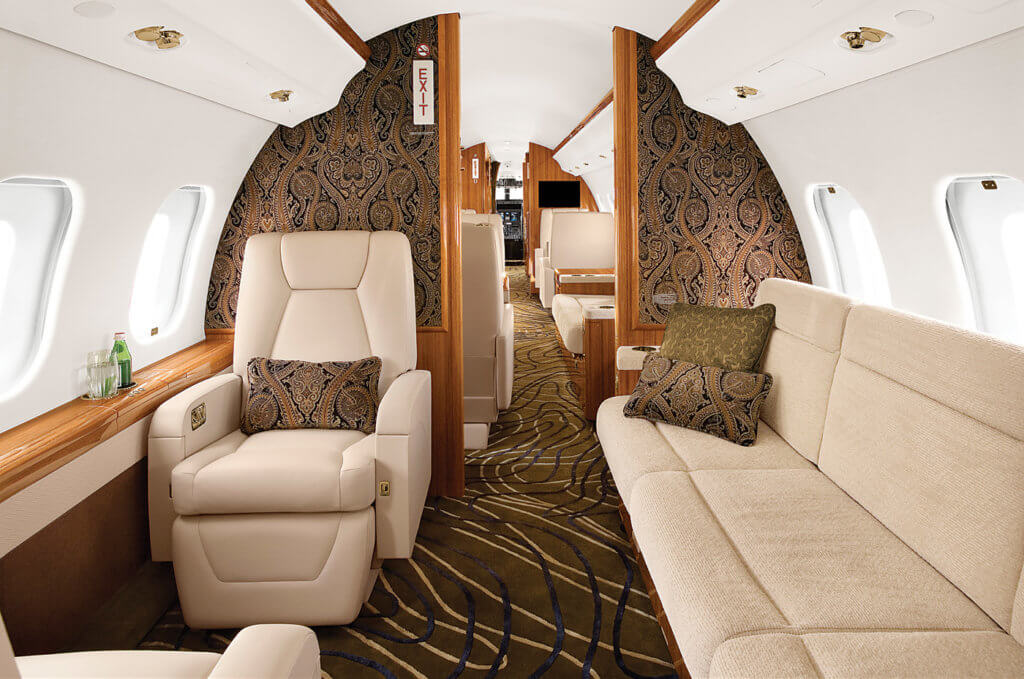
Changing focus
These are challenging times for business aviation. According to analyst Rolland Vincent in AvBuyer’s September 2016 Business Aviation Market Summary, new business aircraft production rates are beginning to slow; however, the market continues to be oversupplied for the current demand. New aircraft sales are in a slump, and those that do sell are usually deeply discounted.
The residual value of used business jets is also trending downward while inventory is on the rise. According to JETNET and GAMA, cited in the same market report, used jet sales are surpassing new deliveries by a ratio of about 3 to 1.
“The world economy is a big challenge,” admitted Brooks. “We were fortunate in the 2008 collapse. We were insulated from a lot of that because high net worth individuals were taking delivery of aircraft. The Middle East was active; Russia was active; oil was high. Now, we see sanctions placed on Russia and the price of oil has declined. The whole economy is hurting and one of the first things that goes is the corporate jet. The price of used aircraft has decreased substantially.”
As such, many companies have no current plans to replace their aircraft. Fortunately, Innotech is a diverse operation, meaning it can shift its emphasis to MRO and aircraft refurbishments.
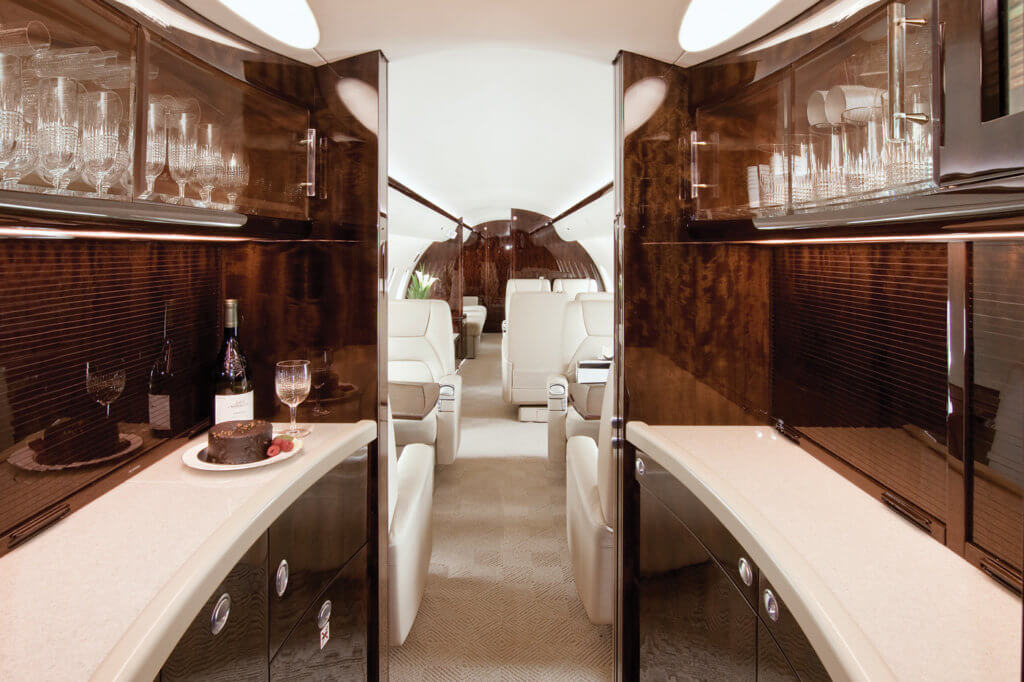
“Our business model, because of the lack of aircraft sales, has been weighted heavier on MRO in the past 12 months until we see airplane sales picking up,” confirmed Brooks. “Historically we were probably 70 per cent completions, 30 per cent MRO, but now that has switched.”
Tony Rawlinson, Innotech’s director of sales and marketing, agreed the industry is going through turbulent times.
“Owners are being very careful with their investment in aircraft,” he commented. “We have a number of contracts that reflect the mood and the challenges of the industry. We’ve done a lot of refurbishment work lately on older aircraft that are due for major inspections.”
One such inspection that keeps the shop busy is the 120-month (10-year) check on the Global. It’s a heavy inspection that involves removing the aircraft’s entire interior to facilitate an internal examination of the fuselage. So far this year, Innotech has completed several 120-month Global inspections. Overall, the company completes about 125 aircraft maintenance inspections (of varying lengths) each year.
Rawlinson said that since the interior is removed during the 120-month check, this is a good time for aircraft owners to upgrade systems or interior components.
“It’s an opportunity for owners to refresh the interior or maybe upgrade technology,” he said. “That’s what we do; that’s what we specialize in. We not only do the maintenance work, but we also have that interior cabin expertise and can re-do wood, cabinetry, and soft goods like leather, sidewalls, etc.”
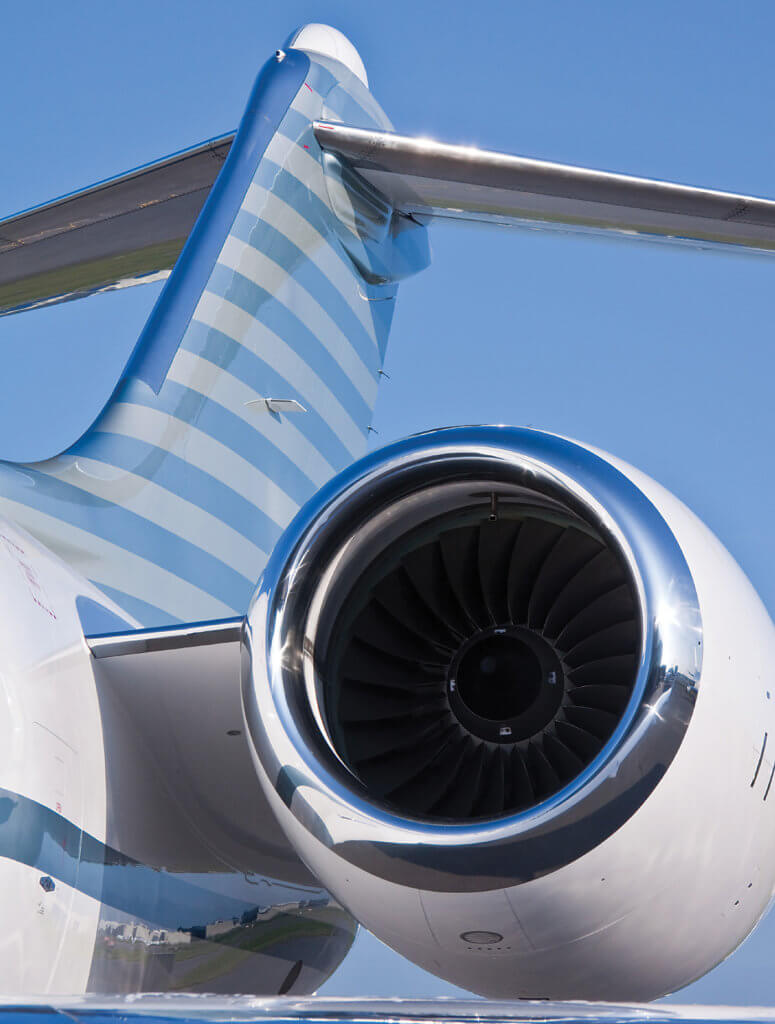
Brooks confirmed that very few shops can offer the complete range of services performed by Innotech.
“Our capabilities include sheet metal, engineering, upholstery, cabinetry, paint–everything is kept in-house and very few MROs can compete with what we do here,” he said. “We don’t outsource anything. The huge advantage we have over any other normal shop is that being a completions centre, we have a full team of experts that do nothing but remove and install interiors. So we have a really good understanding of how to remove and re-install them so they look like the day they came out of the factory.”
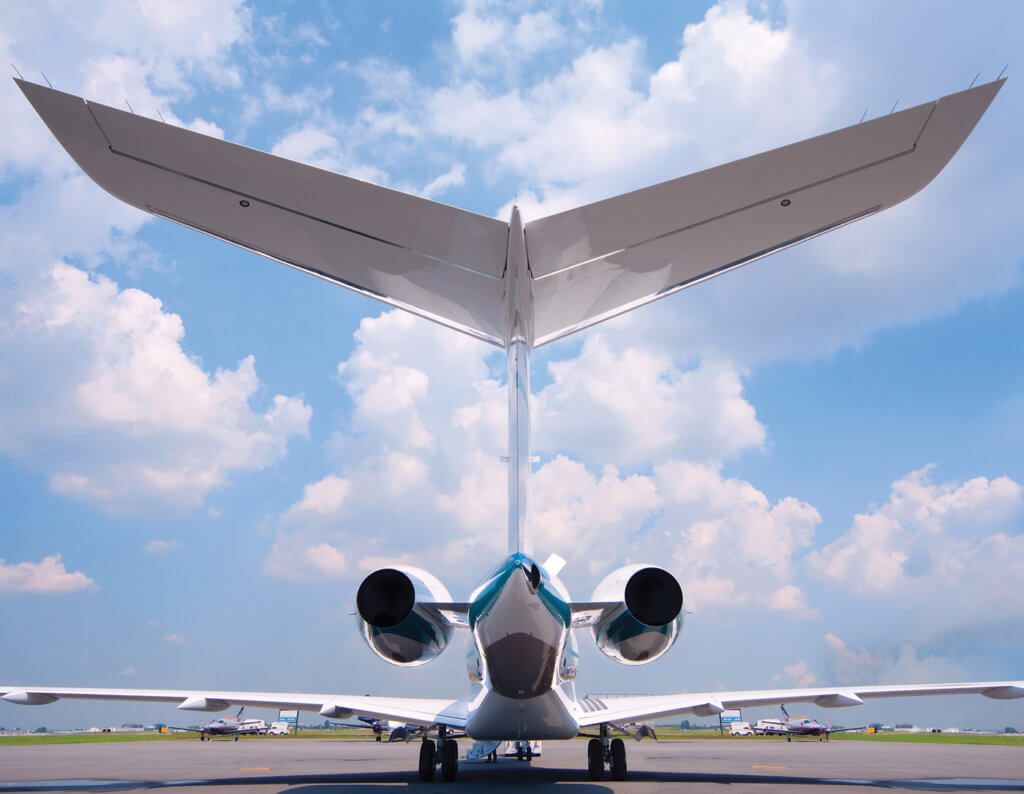
Sometimes, work can even be done without the aircraft onsite. Innotech’s extensive engineering knowledge and years of experience with the Challenger and Global lines means that some advanced modifications can proceed in the shop before the aircraft arrives in Montreal for the installation.
The company currently holds several dozen supplementary type certificates (STCs) for modifications or repairs to Challenger and Global aircraft. Its work is recognized and approved by aviation authorities from around the world.
“I would think there isn’t anything associated with those aircraft types that we would not want to do,” mused Brooks. “We’ve done everything from replacing major structural skins to building new interior installations, designing new configurations, putting Wi-Fi systems on board, ADS-B, WAAS, FANS, full strip and paint, every capability to repair, maintain, build and rebuild.”
Six decades of excellence
In 2015, Innotech Aviation celebrated its 60th anniversary. Brooks said the company’s success has been built on a firm foundation of employee knowledge along with solid industry relationships and a constant commitment to excellence.
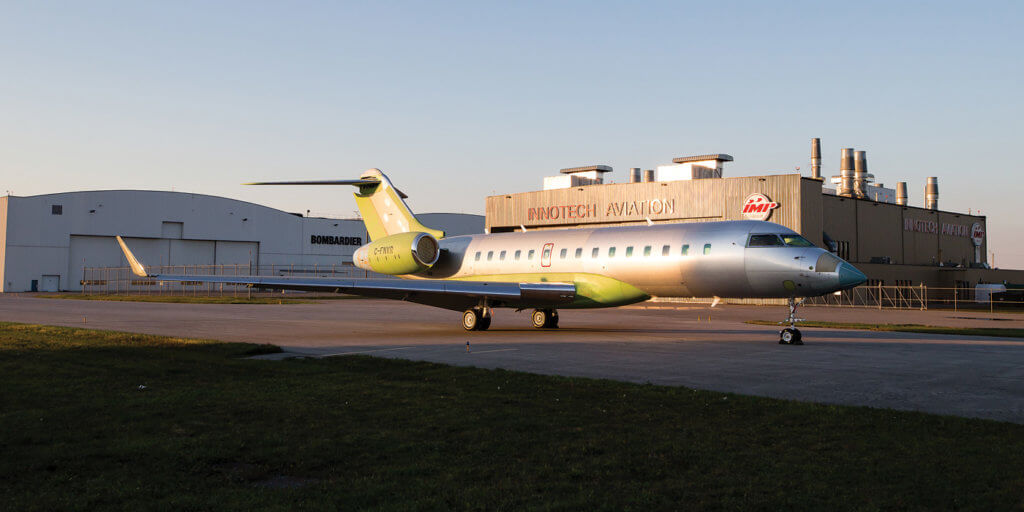
The non-unionized company invests in its workforce, offering an extensive staff training program in association with the Canadian Council for Aviation and Aerospace to further its in-house capabilities.
“Our online training includes over 160 training segments,” said Brooks. “It’s not just mandatory training, although all of that is tracked, but there is also training for interior and backshops. Within our employee classification there are multiple pay grades. Education gives our people accreditation and a sense of ownership, and performance is tied to training.”
Innotech runs two normal day shifts, plus an overlapping three-day weekend shift of 12-hour days.
One area of specialization is the company’s FAA-certified STC for the installation of Ka/Ku high-speed satellite broadband on the Global Express. The service provides a seamless global Internet connection in-flight.
Innotech was also at the forefront of ADS-B implementation for its foreign customers in Australia and Singapore, where ADS-B is further advanced than in North America. Brooks said ready solutions are just becoming available here, although he added this could be an area of future opportunity for Innotech.
Selling the service
It’s up to Rawlinson’s sales team to sell Innotech services to the owners of Bombardier Challenger and Global aircraft.
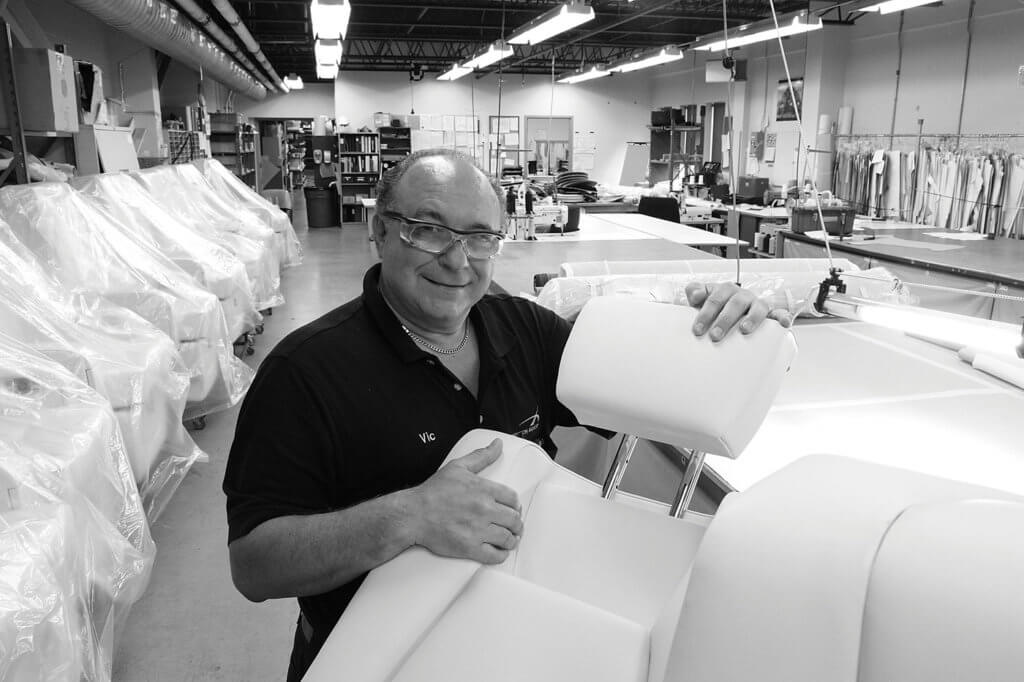
“My team is the main sales driver for the organization,” said Rawlinson. “My role is to develop the in-service sales activity–maintenance, refurbishment, paint, completion work.”
That activity could range from a small job, such as a windshield replacement, all the way up to the previously mentioned heavy maintenance inspections. While maintenance checks can’t be deferred, it’s up to the sales team to upsell some of the company’s “soft goods” services that will help entice customers to the Montreal facility.
When they do arrive, customers will be relieved to deal with a single project manager, with whom they can communicate on a daily basis. Innotech has also created an online customer portal where owners can log in to see their job’s progress, complete with photos, and provide an online authorization for any additional work being proposed.
With only a glimmer of recovery expected in the business jet market for 2017, Innotech will continue to focus on what it does best.
Beyond that, Brooks is excited about the launch of Bombardier’s new Global 7000 ultra-long-range business jet, currently under development. Reportedly, the OEM has assigned its full resources to the program now that the C Series commercial jets have been certified. The Global 7000 is expected to enter into service in late 2018.
“I think a lot of people have stalled their positions to wait for that airplane to come out,” said Brooks. “I think it will capture a good share of the market. And, of course, I hope it will bring us opportunities as well.”
Business jet sales may be stagnant heading into 2017, but diverse companies such as Innotech Aviation have seen these cycles come and go, many times over. Fortunately, the Innotech brand is internationally synonymous with quality and, by turning its focus to MRO instead of sales, the company is set to weather this latest spell of industry turbulence.

